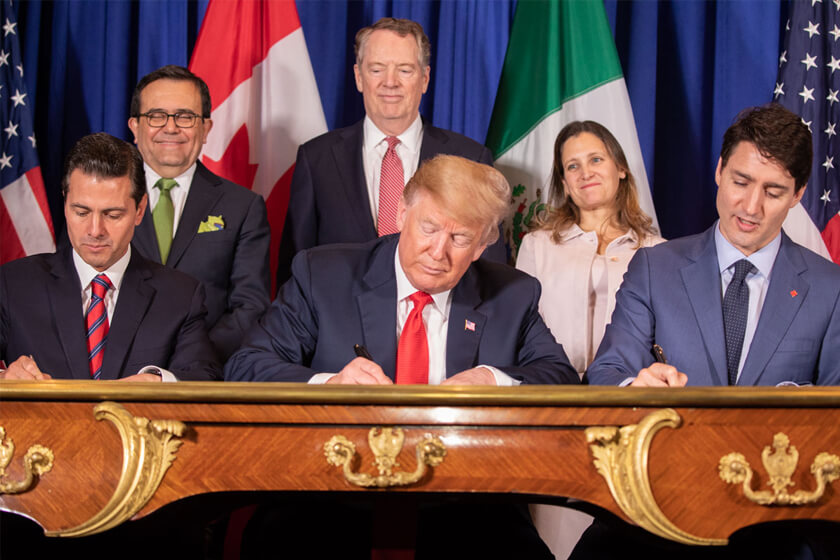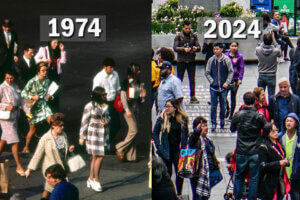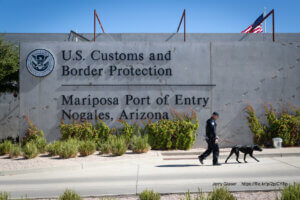West Long Branch, NJ – Republicans have become free trade enthusiasts, although a significant number of Americans have not formed an opinion of USMCA, the recently approved North American trade agreement. The Monmouth University Poll also finds that there is a split decision on whether USMCA will be better for the country than NAFTA, the treaty it will replace, but very few Americans register a negative opinion of the new trade deal.
Most Americans have not formed an opinion of USMCA – the United States-Mexico-Canada Agreement – that was approved by Congress last week. While 33% of the public approves of this new trade deal and only 5% disapproves, a majority (61%) has no opinion on this. Just 19% of the public has heard a lot about USMCA and 45% has heard a little, while 37% has heard nothing at all. Among those who have heard at least a little about the trade deal, 48% approve of it, 7% disapprove, and 45% have no opinion.
Republicans (53%) are more likely than independents (29%) and Democrats (24%) to approve of USMCA, but there are much smaller partisan differences on disapproval (just 1% of Republicans, 6% of independents, and 8% of Democrats). Just under half of Republicans (45%) have no opinion on the new deal, compared to about two-thirds of independents (65%) and Democrats (68%).
“President Trump’s new deal seems to have convinced a number of Republicans to get on the free trade bandwagon,” said Patrick Murray, director of the independent Monmouth University Polling Institute.
A majority of Americans (57%) say that free trade agreements with other countries are good for the United States, while just 10% say they are bad and 29% are not sure. Opinion that free trade deals are good for the U.S. has increased from 51% last year and 52% in 2018. The recent uptick of positive views on free trade has come almost entirely from Republicans (from 40% in 2019 to 68% now), while opinion has been more stable among independents (56% in 2019 and 55% now) and Democrats (55% in 2019 and 53% now). Back in 2015, far fewer Americans saw free trade as good for the U.S. (24%) and there was no partisan difference in this opinion – 23% of Republicans, 24% of Democrats, and 24% of independents alike had a positive view of these deals.
The public is divided on whether NAFTA – the three-nation trade agreement that has been in effect for more than 25 years – has been good (31%) or bad (27%) for the country. Another 9% say it has not had much impact either way and 33% are unsure of what its impact has been. This opinion is nominally more positive than it was in 2015, when 18% said NAFTA had been good and 24% said it had been bad.
There is a distinct partisan gap in opinion of the existing treaty. The original NAFTA agreement was signed by President George H. W. Bush in 1992, but it wasn’t approved by Congress until the following year when President Bill Clinton took office. Currently, opinion of NAFTA stands at 13% good to 50% bad among Republicans, 35% good to 27% bad among independents, and 41% good to 8% bad among Democrats. This partisan gap was significantly narrower in 2015 (12%-31% Republicans, 19%-24% independents, and 23%-20% Democrats).
The Monmouth University Poll finds that 31% of the public expects that the new USMCA deal will be better for the country than NAFTA has been, 8% feels that it will be worse, 30% says it will be about the same, and 31% do not have an opinion. Among those who have heard at least a little about the new deal, 43% say it will be better than NAFTA, 9% say it will be worse, 29% say it will be the same, and 20% have no opinion. By party affiliation, Republicans (61%) are significantly more likely than either independents (30%) or Democrats (8%) to expect USMCA will be better for the country. However, there is not much partisan difference in the number who think it will actually be worse (3% Republicans, 7% independents, and 12% Democrats).
The Monmouth University Poll was conducted by telephone from January 16 to 20, 2020 with 903 adults in the United States. The question results in this release have a margin of error of +/- 3.3 percentage points. The poll was conducted by the Monmouth University Polling Institute in West Long Branch, NJ.
QUESTIONS AND RESULTS
(* Some columns may not add to 100% due to rounding.)
[Q1-7 previously released.]
8. In general, do you think that free trade agreements with other countries are good or bad for the United States, or are you not sure?
| TREND: | Jan. 2020 | May 2019 | June 2018 | Nov. 2015 |
| Good | 57% | 51% | 52% | 24% |
| Bad | 10% | 14% | 14% | 26% |
| Not sure | 29% | 29% | 30% | 46% |
| (VOL) Depends | 3% | 6% | 5% | 3% |
| (n) | (903) | (802) | (806) | (1,012) |
9. Do you think NAFTA, the free trade agreement between the U.S., Canada, and Mexico that went into effect in 1994, has been good or bad for most Americans, has not had much impact on most Americans, or are you not sure?
| TREND: | Jan. 2020 | Nov. 2015 |
| Good | 31% | 18% |
| Bad | 27% | 24% |
| Not much impact | 9% | 16% |
| Not sure | 33% | 43% |
| (n) | (903) | (1,012) |
10. The United States has recently approved a new trade agreement with Mexico and Canada, called U. S. M. C. A. or “Us-macca,” which will replace NAFTA. Have you heard a lot, a little, or nothing at all about this?
| Jan. 2020 | |
| A lot | 19% |
| A little | 45% |
| Nothing at all | 37% |
| (n) | (903) |
11. Do you approve or disapprove of this new trade deal with Mexico and Canada, or do you have no opinion on this?
| Jan. 2020 | |
| Approve | 33% |
| Disapprove | 5% |
| No opinion | 61% |
| (n) | (903) |
12. Compared to NAFTA, do you think this new trade deal will be better, worse, or about the same for the United States?
| Jan. 2020 | |
| Better | 31% |
| Worse | 8% |
| About the same | 30% |
| (VOL) Don’t know | 31% |
| (n) | (903) |
[Q13-27 previously released.]
METHODOLOGY
The Monmouth University Poll was sponsored and conducted by the Monmouth University Polling Institute from January 16 to 20, 2020 with a national random sample of 903 adults age 18 and older. This includes 363 contacted by a live interviewer on a landline telephone and 540 contacted by a live interviewer on a cell phone, in English. Telephone numbers were selected through random digit dialing and landline respondents were selected with a modified Troldahl-Carter youngest adult household screen. Monmouth is responsible for all aspects of the survey design, data weighting and analysis. The full sample is weighted for region, age, education, gender and race based on US Census information (CPS 2018 supplement). Data collection support provided by Braun Research (field) and Dynata (RDD sample). For results based on this sample, one can say with 95% confidence that the error attributable to sampling has a maximum margin of plus or minus 3.3 percentage points (unadjusted for sample design). Sampling error can be larger for sub-groups (see table below). In addition to sampling error, one should bear in mind that question wording and practical difficulties in conducting surveys can introduce error or bias into the findings of opinion polls.
| DEMOGRAPHICS (weighted) |
| Self-Reported |
| 27% Republican |
| 42% Independent |
| 32% Democrat |
| 49% Male |
| 51% Female |
| 30% 18-34 |
| 34% 35-54 |
| 36% 55+ |
| 64% White |
| 13% Black |
| 16% Hispanic |
| 8% Asian/Other |
| 68% No degree |
| 32% 4 year degree |
Click on pdf file link below for full methodology and crosstabs by key demographic groups.




